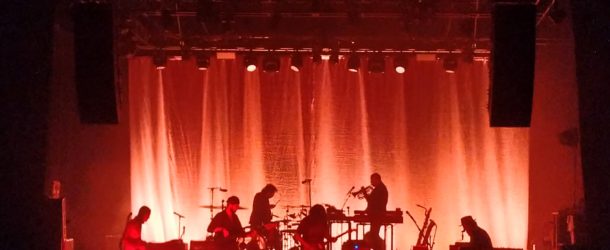When I learned of the inaugural 3-day benefit concert The War on Drugs was having in late December of 2018, I couldn’t think of a better reason to spend the rainy Thursday afternoon fighting for legroom on a hot Peter Pan bus going to Philly from New York.
Amusingly titled A DrugCember to Remember, benefit included three concerts in three different spaces across the band’s home state. All shows were to benefit The Fund for the School District of Philadelphia, and all shows had very limited tickets. Gaining entry to one of these nights was no longer a matter of hopping on Ticketmaster at a precise time. Instead, buying a ticket was a matter of winning a lottery that would charge your card a month prior to the show if you won, and not if you didn’t.
The apparent exclusivity of these shows isn’t what should have drawn people in, though. It’s the raw emotion, the complete surrender to vulnerability, that should be followed across state lines. Watching The War on Drugs perform is like being in suspended animation; everything is put on hold in service of preserving something else – perhaps the moment, perhaps the music.
Granduciel’s low voice carries and delivers the words he wrote to manage some of his most emotionally taxing times. From exploring the struggles of romance to depression and anxiety, the War On Drug’s music maps the trajectory of one man battling his own demons in the face of thousands.
When he stepped up to the mic at the show I saw, in Philadelphia, his long hair surrounding his face, his words transformed the farmer’s-market-turned-music-venue into a temple. I could barely see the gothic-style chandeliers that hung from the high ceiling in the mid-sized main room of Union Transfer. The yellow overhead lights dimmed the second the purple stage lights brightened. Granduciel started off with an oldie from the band’s second album, “Slave Ambient,” which may have come as a surprise to fans who know only their more popular records, “Lost In The Dream,” which put them on the map, and “A Deeper Understanding,” which won them a Grammy.
Granduciel is a rock star with anxieties about being a rock star. Aside from the few interviews in which he has openly discussed his psychological battles, Granduciel’s mental state is reflected in the way he hangs his head on stage, staring down at his multi-colored Fender guitar for longer than he does the audience. It’s also reflected in the music itself: “Wading in the water/Just trying not to crack/Under the pressure.” What follows are several minutes of a synthesizer’s low drone, which continues to buzz in the ear long after it fades away.
Whether it’s the way the harmonica fizzed in my bones, the drum pounded in my chest or the guitar murmured in my ears, pleading to sound like its own voice, the marriage of the instruments on stage and the others that accompany them enveloped me, making the performance almost tactile. It can only be compared to a dream.
The six-man band’s set concluded. The crowd no longer bore the painful uncertainty conveyed in songs like “Strangest Thing” or the more hopeful, but still aching, “In Reverse.”
Granduciel closed the night with a lengthier rendition of the already lengthy “In Chains” and his words trailed off with his final lyric: I don’t read your mind, can we choose? The harmonious sounds that followed pumped into the air for minutes, engrossing the crowd one last time.
It certainly was A DrugCember to Remember.


